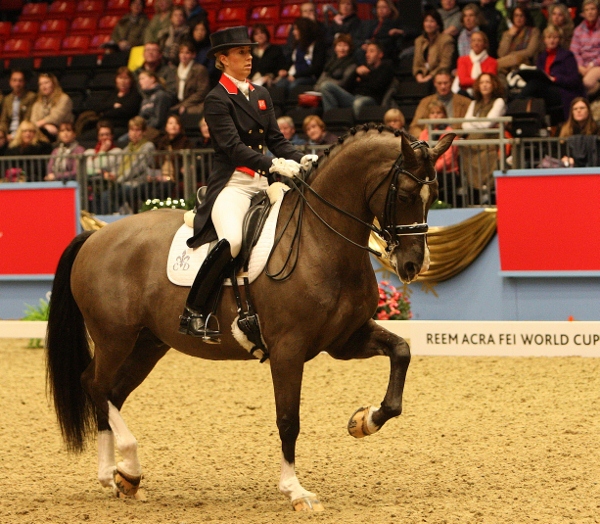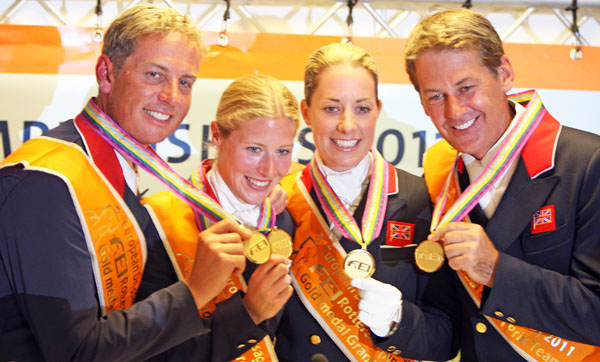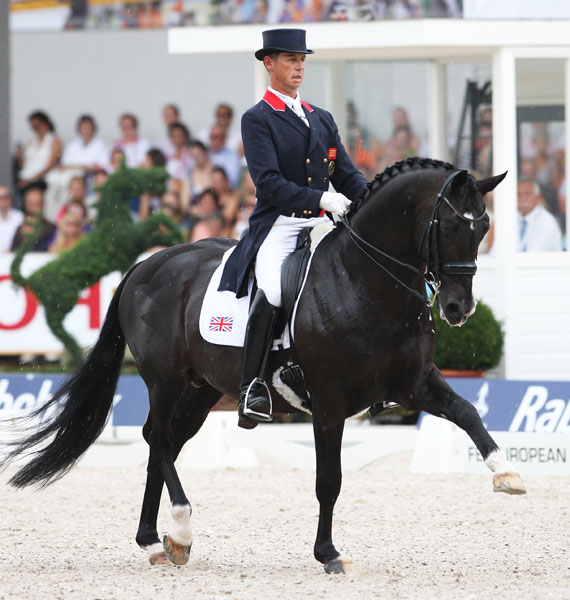Carl Hester: His Horses & History – Part 1 of 2
13 years ago StraightArrow Comments Off on Carl Hester: His Horses & History – Part 1 of 2

By KENNETH J. BRADDICK
When Valegro enters the arena at the World Dressage Masters Palm Beach for his first appearance outside Europe, Carl Hester will be watching the 10-year-old gelding he and Charlotte Dujardin, his student and the rider, are convinced is one of the best dressage horses in the world.
And he may even shed a tear, not for what could be for him as an owner, trainer and top international rider, but in joy for the accomplishments of his 26-year-old protégé who became the sixth rider to join the elite band to break the 80 per cent barrier for the Grand Prix in 2011–three of them Britons.
With Carl’s guidance, she has come close to his results on Uthopia, a horse like Valegro he found and most likely will make up two-thirds of the British team–the other one-third will undoubtedly be superstar Laura Bechtolsheimer and Mistral Hojris. Britain is the favorite to capture gold at the Oympic Games in London this summer, an achievement that could trigger national rejoicing in a country that has never won an Olympic dressage medal of any color.
Carl’s tears were on display at the European Championships in Rotterdam when Charlotte and Valegro were teamed with Carl and Uthopia, Laura and Mistral Hojris and Emile Faurie and Elmegardens Marquis to win Britain’s first ever European gold.
After the experience of competing Valegro in 2011, as young as she is but confident in her skills Charlotte dreads fulfillment of the intention to sell the horse after the Olympics. Carl hopes to line up a British buyer.
“No,” she said adamantly. “I will never have another horse like him. He is one of a kind, very special.”

And that says much about the 44-year-old from the tiny island of Sark in the English Channel where the sheep derby is a highlight of the annual sports calendar. He was a teenager before he had any clue about international equestrian sports and Horse & Hound never graced his family coffee table.
Now, a quarter century since he got his first big break riding for Dr. Wilfried Bechtolsheimer, Laura’s father, Carl understands as well as anyone how rare is there an opportunity to not only compete at an Olympics but to be ranked among the elite with the benefits that brings. Does he think about Valegro being his mount, he is often asked,
“Obviously, I bought him for me,” he told dressage-news.com. “I kept half of him for me. I have my friends in Holland who tell me, ‘It it obviously would be good for promoting Dutch breeding because you ride Dutch horses. Why don’t you sit on Valegro; you’re guaranteed the gold medal.’
“Yeah, I do think about it. But I’m not doing it. I’m not doing that to Charlotte.
“I can say that because of the pleasure I get out of watching her ride him. If I didn’t get any pleasure out of that it wouldn’t be worth it. But at the Europen Championships where she rode this year I cried. I could never imagine why I would ever cry over dressage.
“To watch her do that test, the proudness I felt was just incredible. I was absolutely hanging off the side. Do you know what that was, I later thought when the championships were over, that was great.”
Is he that involved it could happen again? The short answer is, yes, and no one around to see it.
The week before Charlotte rode Valegro at London’s Olympia to break that 80 per cent barrier, they scheduled a practise ride of the freestyle music at Carl’s farm.
“We warmed the horse up,” Carl recalled. “I was watching the horse that morning and I thought, ‘To me it looks like the best horse i’ve ever seen.’
“I get the car out, open the doors, put the music on, a bit country bumpkin style. There I am standing on the side of the arena on a Tuesday morning, already done four lessons, I’m starting to feel tired and I’m watching her. At the end of the test I’m crying… in my own arena. I had to walk away because that was incredible.
“I found the whole thing just gets too much for me. She’s so talented, the horse is so talented, they are a great combination.
“I just could NOT do that, I could not take that horse away.
“He’s my horse. I have the pleasure of sitting on him when I want to. I can hack him out on Christmas Day if I want to. I do things like that sometimes, to give myself a treat. I stick a snaffle on him and wander around the roads. He’s an old man’s horse.”
In fact, Tricia Gardiner who was a member of Britain’s team at the 1988 Seoul Olympics and is nearing 80 years of age, visits Carl twice a week for a hack. Her favorite, he said, is Valegro–“this is not like some horse for dressage riders, this is something for my friend Trish.”
“I get a lot of pleasure from Valegro,” he said. “People don’t understand why I’m not doing it, but I would be wasting it.

“At the end of the day, Uthopia is not for anyone else to ride, so it’s not like I can say to her, ‘You take Uthopia.’
“I’m wasting a team slot if I take that horse back. If it keeps going like this, there would be no need, no point.”
Carl is still amazed at how quickly dressage has grown in popularity in Britain.
Most other countries, notably Gemany and The Netherlands, are “building up and building up.”
“We don’t have that long history like Germany and Holland, and the expectations that go with it,” he said.
“Is it more exciting because you don’t have expectations? Yeah, I think it is. actually, because I certainly know from my own point of view going back to my first Olympics when no one thinks you’re going to do any good you have the last laugh at everybody. That’s the beauty of coming to a championship without expectations.
“Yes, we now have expectations, but it’s not like they’ve been built for many years. It’s not like every one has been waiting for years and years because we’ve been winning every year, because for us it’s never happened before. I think we’re going in with a great head and a good team. We have three superstar horses and all of us probably do the same thing–we go to the stables every day and touch wood that they’ll stay fit and they’re not going to be taken away and things remain as they are now.”
What has changed in British dressage, he believes, is not that the quality of riders has changed but that there are better horses now.
“When I look at Britain as a horse nation I think we’ve always had good dressage riders,” he said, “we’ve had fairly, maybe not top horses. Good riders with good education. We’ve just never had this quality of horses to catapult us into what people call a ‘Dressage Nation.’
“What would happen if those three horses disappeared? We would be where we were 20 years ago and people would be saying, ‘Great Britain can’t do dressage.’
“Well they can. Every country is struggling to do the same thing–to produce or find the superstars. It’s a shame that three horses can make or break a reputation, three superstar horses that apparently can make us a ‘Dressage Nation,’ and without them we’re absolutely out of it.
“You look at every team from every country. Some people stay at the top for a long time, the longevity of the sport means you’re learning and teams get better and better and that’s why our percentages are so much higher today.
“Its a battle you can’t give up on, that for sure.”
Next: Carl Hester: His Horses & the Price of Popularity – Part 2

